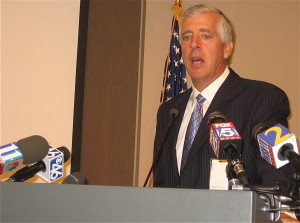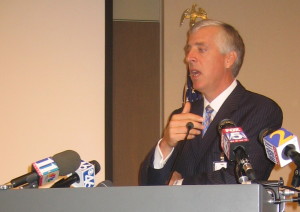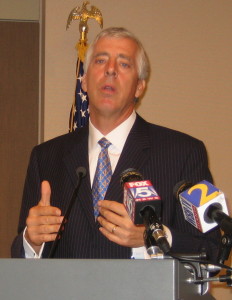New Grady Hospital CEO Outlines His Vision
(APN) ATLANTA — The Grady Memorial Hospital Corporation (GMHC), the hospital’s newly privatized Board, introduced Grady’s new CEO to the public during a press conference Monday, August 04, 2008.
As previously reported in Atlanta Progressive News, the GMHC voted July 21, 2008, to install Michael A. Young, previously the head of the Erie County Medical Center (ECMC) in Buffalo, New York, as the new CEO at Grady.
Young managed to turn around once-troubled ECMC into a successful, profitable enterprise in three years there. He would like to see Grady break even financially in two and a half to three years, he said Monday.
“I’m optimistic in that the core that Grady is built off of, are its physicians and its nurses and they’re superb,” he raved. “Most hospital turnarounds require quite a bit of work with the medical delivery model and we don’t have to do that here because of the stellar staffs from Emory and Morehouse and our nursing staff it’s really going to be pretty easy.”
Young, who has over 20 years executive experience at three other hospitals, arrived in Atlanta on July 30, 2008, and has been speaking to Grady doctors, nurses, employees, and other community members since, on how he plans to turn Grady around.
“I’ve learned over the years that I need your help,” Young said. “I need the community’s help, I need the [Metro Atlanta] Chamber [of Commerce], I need the corporate community, I need the political community, we need the religious community, we need the left, [and] we need the right because, to healthcare, there is no judgment.”
“Disease does not care what color you are, they don’t care where you live and neither do I,” he added. “Our goal is to deliver healthcare that Atlanta can be proud of.”
Young noted restoring accountability and responsibility at Grady will be important. This was a reference to the fact that critics had charged the Fulton Dekalb Hospital Authority with lacking accountability and responsibility, even though they never cited any specific examples.
“Every employee, every doctor, every nurse, and every patient will need to understand what their responsibility is,” he said. “You have to look at the system from a patient’s perspective and make everybody accountable.”
When asked what he would like to accomplish in the first 90 days, Young said he wants to identify aging capital equipment and put new equipment on order. He noted this task will be easier because of the $200 million pledge from the Woodruff Foundation.
“The most intriguing part of the opportunity is the capital gifts that have been given to Grady — it’s a once in a lifetime opportunity,” Young said. “As hospitals around the country are struggling for capital, we’ve been blessed with this Woodruff gift. We have a blessing of being able to acquire the technology that will move Grady back into the cutting edge forefront.”
Grady is already set to receive new beds to replace the current, woefully out of date stock. The Atlanta Journal-Constitution newspaper reported July 31, 2008, Grady is receiving 604 state-of-the-art beds at a rate of 52 per day over the next two weeks.
The beds, which cost $8.3 million, are the first major purchase with the $50 million Woodruff donated in May.
Young also wants to make management more efficient in order for other processes at Grady to run more smoothly.
“We have everybody doing everything [right now] which means no one is doing anything because there’s no continuity,” Young said.
“Once you get these hundred people rowing in the right direction, then you begin to see real progress,” he added. “That is the Board’s job and my job to make the capital match those processes changes. That’s high-level policy decision making that has to happen.”
While he said he could not promise existing services would not be cut, Young noted he did not have to make such cuts at ECMC.
“When we were losing $30 million in Buffalo, we didn’t cut any programs,” he noted. “As a matter of fact, we added programs that we needed.”
While he did not promise all current Grady services would remain intact, Young challenged the community to think about how existing services could be delivered better.
“If I can deliver the same pharmacy model, which means getting the right drugs, the right patient at the right time, and I can do it without making people stand in line for four hours and I can do it without losing $4 million, is that a change in service or is that an improvement in services,” Young asked.
“You have to ask the community what it is that you really want,” he added. “You want everybody treated the same, you want the same drug but they [the community] think they want to keep it exactly the same. I’m just telling you exactly the same is failed, broken, bad, unprofessional, and shouldn’t be tolerated. Can I fix those things all this week? No, but that is the goal.”
In addition to improving services and equipment, Young wants to decrease registration and ER wait times as well as stop the financial hemorrhaging currently afflicting Grady.
“Over 22 years, I’ve learned what the right decisions are and will make those decisions,” Young said. “If you bring honesty, integrity, fairness, real live bids – you take the politics out of it. When you do those things, Grady will be in the paper for the right reasons or on TV for the right reasons.”
“I told the [GMHC] that hospitals are either spinning down or they’re spinning up and Grady is spinning down,” he added. “I’ve got my hand on it – I’m a strong guy – and with all your help we can stop the top from spinning that way and get it spinning the other way.”
Young is set to officially take over as CEO in early September.
About the author:
Jonathan Springston is a Senior Staff Writer for The Atlanta Progressive News and may be reached at jonathan@atlantaprogressivenews.com.
Revised syndication policy:
Our syndicaton policy was updated June 2007. For more information on how to syndicate Atlanta Progressive News content, please visit: http://www.atlantaprogressivenews.com/extras/syndicate.html


